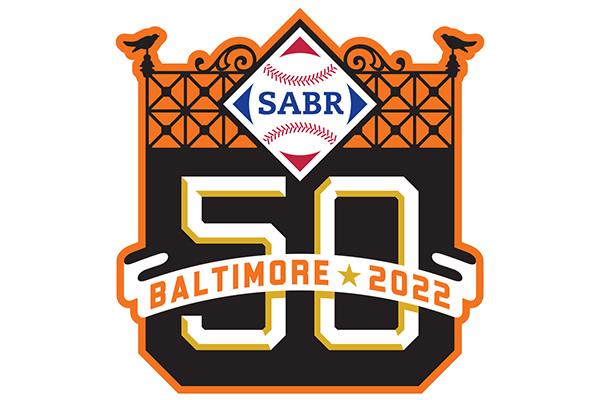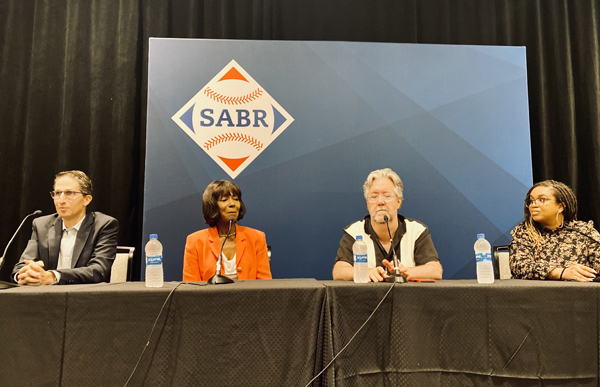SABR 50: Listen to highlights from Flood v. Kuhn: Fifty Years Later panel
At SABR 50 on August 20, 2022, a special panel discussion was held focusing on the 50th anniversary of Curt Flood’s lawsuit against Major League Baseball. On June 19, 1972, the United States Supreme Court ruled against Flood in his effort to dismantle baseball’s reserve clause.
Our panelists for Flood v. Kuhn: Fifty Years Later included Judy Pace Flood, Curt Flood’s widow and a pioneering African American actress; Mark Armour, award-winning baseball historian and co-writer of the MLB Players Association’s official history; Brad Snyder, Georgetown University law professor and author of A Well-Paid Slave; and moderator Shakeia Taylor of the Chicago Tribune.
- Audio: Click here to listen to the Flood v. Kuhn: Fifty Years Later panel (MP3; 58:41)
Here are more highlights:
On the racism faced by Black players in the 1960s
- Flood: “I always refer to racism as the Great Handicap for major league players and players in other sports. They had to go through so much. … When Bob Gibson and Curt Flood were playing with the St. Louis Cardinals, they couldn’t (always) use the clubhouse. They would get dressed in whatever boarding house they were living in, because they could not use the hotels (that the White players were staying in.) They would get a Black taxi, because (White-owned taxis) couldn’t have a Caucasian man driving a Black man around. They had to go get some breakfast in whatever place would have them and go to the ballpark in their uniform. … After the game, you have to not get on the (team) bus, walk across the parking lot, soaking wet in your uniform while fans are trying to get autographs, and go outside the gate to get the Black taxi. … One day, Mr. (Cardinals owner Gussie) Busch saw them walking through the parking lot and yells out of his car, “What are you guys doing out here?” And Bob Gibson says, “Mr. Busch, we’re not allowed in the clubhouse.” Mr. Busch was very surprised, he did not know this. … Around 11 o’clock one night, Mr. Busch’s chauffeur comes knocking on their door and says, ‘Get your things, Mr. Busch wants you to move to the hotel.” … Mr. Busch bought the hotel, overnight. So that was really quite a great change. … They still had to go to the ballpark in their uniform because they couldn’t use the clubhouse. And when they came back for dinner, (the hotel) had built a partition to separate the Black players so nobody could see them. … I call that a handicap.”
On life under the reserve clause in the 1960s
- Snyder: “In every standard major-league contract, it said “we own you for this year and we own you for next year, too.” … Back then, there was no Scott Boras. There were no player agents. The players were negotiating directly with Cardinals management, with GM Bing Devine. … In 1969, Curt gets traded from the Cardinals to the Philadelphia Phillies, which as he said himself, was the worst organization for a Black player to go to in the major leagues. … This was not well-timed for Marvin Miller, only three years in as the head of the MLB players union in 1969. He told Curt, “If you sue Major League Baseball, it’s a million to one shot. You will never see a dime.” And Curt said,” Will it benefit future players? That’s good enough for me.”
On Curt Flood’s meeting with the MLB Players Association before filing his lawsuit
- Flood: “When it was over, they came out and Curt had a smile on him that I had never seen before. He said he wanted a unanimous vote and that’s what he got. The players were behind him 100 percent. He was so happy and so proud. He knew the dangers (in coming forward), just like Martin Luther King Jr. knew the dangers. Everyone knew the dangers, but they went forward. If everyone who knew the dangers stayed home, there would not have been a civil rights movement. So he went forward and the union went forward.”
On Flood leaving the country after the Supreme Court decision
- Flood: “He was being threatened all the time. He left for his safety. He grew a beard, even when he was in Copenhagen and when he went to (live in) Spain so nobody could recognize him, so he wouldn’t be a target. He had seen too many great men killed. He was trying to change a system that did not want to be changed. … So when he left, I knew he was going to be there for a while.”
On the MLBPA fighting for an independent arbitrator to rule on player grievances
- Armour: “(Commissioner) Bowie Kuhn fancied himself as the successor of Judge Landis, (upholding) the integrity and honesty of the game. He told (MLBPA executive director Marvin) Miller that he had to be the arbitrator of baseball because of the Black Sox and all of these problems baseball had in the 1910s and ‘20s. Miller was not really worried about throwing games so he said, “We’ll give you that, you can (decide) on integrity issues and the grievance arbitrator will not deal with that.” And Kuhn said, “Fine, that’s all I want.” And the other owners said, “You just gave away the whole store!” Miller said in his book that this was the win he needed (to eventually force free agency.) And he got it.”
For more coverage of SABR 50, visit SABR.org/convention.
Originally published: September 1, 2022. Last Updated: September 2, 2022.



